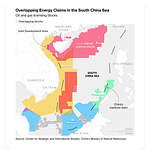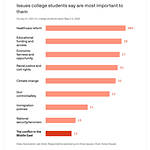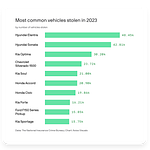Three news stories summarized & contextualized by analytic journalist Colin Wright.
China EV price war to worsen as market share takes priority over profit, hastening demise of smaller players
Summary: A wave of discounts on popular electric vehicles in China has resulted in price-drops of an average of 10% on 50 models over the past three months as carmakers compete to grab market-share in the hottest EV market on the planet.
Context: Only a few Chinese EV-makers are profitable right now, and some—including BYD—are investing heavily in expanding to foreign markets, which is causing all sorts of disruptions in those markets, as local competitors can’t come close to these Chinese brands’ prices; this price war is also raising alarm bells within companies like Tesla, which has traditionally been a dominant player in this space, but which is being elbowed-out as these new, cheaper, increasingly high-quality players establish a global toehold.
—South China Morning Post
Student protesters seek amnesty to keep arrests and suspensions from trailing them
Summary: Hundreds of student and faculty protestors have been arrested for protesting what they consider to be their institutions’ and governments’ role in Israel’s invasion of the Gaza Strip, and negotiations between protestors and the folks running the universities where the protests are centered are partially focused on amnesty for those who have been arrested or otherwise punished.
Context: A lot of ink has been spilled reporting on the day-to-day of these protests, in part because of their relevance to various political culture wars that are playing out in the US right now, but alongside these arrests and the in some cases violent crackdowns on protestors by police who have been called in by those running these universities, protesting faculty and students have been punished from within the school system, booted from their jobs or expelled—and those latter concerns are now included in negotiations, alongside demands that the universities divest from weapons companies and Israel-associated entities, even as the culture war-style commentary continues to dominate most of the conversations and headlines about these protests and those involved with them.
—The Associated Press
EPA severely limits pollution from coal-burning power plants
Summary: Last week, the Environmental Protection Agency announced a new regulation that will require coal plants in the US reduce their greenhouse gas emissions by 90% by 2039—a year earlier than originally planned.
Context: The EPA also said coal plants will face stricter limitations on their mercury emissions, will need to better control toxic ash seepage into water supplies, and will have to constrain their wastewater discharge; all of which is being seen as a practical cap on the lifespan of coal plants in the US, as these regulations can only be met at great expense, and analysts are generally assuming the folks running these plants will run the numbers and find that it makes more sense to shut them down than to upgrade them in such a way that they can continue to legally operate.
—The New York Times
View of Athens from the Tourkovounia hills last week, as a cloud of dust blew north from the Sahara desert, cloaking the Greek city in an orange haze; this is a semi-regular occurrence, but the dust clouds of recent years have been more concentrated than usual, which makes it hazardous for locals’ respiratory health and impacts normal, everyday behavior in all sorts of ways.
—The New York Times
7
Number of years the Canadian federal government and Alaskan state government have banned fishing of chinook salmon on the Yukon River, in order to allow the species to recover from years of overfishing that has depleted its population.
Seven years is about the length of a salmon’s total lifecycle.
—CBC News














One Sentence News / April 29, 2024